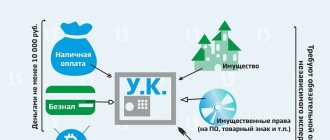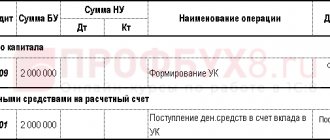Financial assistance from the founder is treated differently in accounting and tax accounting. Why and how exactly – you will learn from our article.
We will also look at:
- what conditions must be met for the receipt of assets from the founder to be recognized as assistance;
- is financial assistance from the founder subject to income tax;
- what document and transactions in 1C are used to document financial assistance;
- how the founder’s contribution should be reflected in the financial statements.
Contribution in cash from the founder (concept and forms)
First, let’s figure out what is meant by a founder’s contribution and on what grounds it is possible.
It is clear that any operation to receive money to a legal entity must be justified, since finances cannot simply appear in an organization. In this regard, the contribution is understood as:
- Contribution to the authorized capital of the company (both during creation and when increasing its size).
- Investment in company property.
- Free assistance (under an appropriate agreement or interest-free loan).
- Payment of contractual obligations (for example, remuneration for work, services, etc.).
- Depositing funds from an accountable person, etc.
In this article, we will study in detail the first 3 options, since they are associated with improving the financial situation of the company and for this reason are used more often than others. In addition, we will further tell you how to arrange a founder’s contribution to a current account, transferred in various ways and on various grounds.
Issuing a loan to the founder: postings
In a situation where a company issues an interest-free loan to the founder, another organization or its employee, no financial investment is formed, since such an operation does not generate income. Therefore, they use accounts 73 “Other settlements with personnel” for settlements with employees, 76 “Other debtors and creditors” to account for the debt of a third-party company. In this case, the recipient receives a material benefit from interest savings, which is subject to personal income tax. The loan is processed using the following entries:
| Operations | D/t | K/t |
| An interest-free loan was issued to a third-party company or to a founder who is not an employee of the company | 76 | 51,52,41,10 |
| A loan was issued to an employee | 73 | 50,51,41,10 |
| Loan repayment | 51,51,52,41,10 | 73,76 |
Payment or increase in the authorized capital of an organization - general provisions
This procedure is regulated by:
- Art. 66.1, 66.2 of the Civil Code of the Russian Federation (hereinafter referred to as the Civil Code of the Russian Federation);
- Art. 15–19 of the Law “On Limited Liability Companies” dated 02/08/1998 No. 14-FZ (hereinafter referred to as Law No. 14-FZ).
According to the above rules, money, things or property rights can be transferred as payment for the authorized capital. Restrictions are permissible only on the basis of law or charter. In this case, the minimum amount of the authorized capital must be paid in cash (Clause 2 of Article 66.2 of the Civil Code of the Russian Federation).
The payment period is established by the agreement on establishment (decision of the sole founder), however this period should not exceed 4 months from the date of registration of the LLC when creating the company. If we are talking about an increase in capital, then it is paid within 2 months from the date of adoption of the corresponding decision (although the charter or decision may provide otherwise).
This method of financing is beneficial to the enterprise, because the contributed property is not subject to taxes, according to clause 3 of Art. 251 of the Tax Code of the Russian Federation (hereinafter referred to as the Tax Code of the Russian Federation).
How is additional capital generated from the founder’s contribution?
How property is transferred to cover the authorized capital is described in detail in the corresponding article on our resource. In this publication, we will examine only the monetary form of repayment of the authorized capital.
There are several payment methods:
You can find more complete information on the topic in ConsultantPlus. Free trial access to the system for 2 days.
- Depositing funds into a savings account, which is opened by one of the founders in the name of the organization being created.
- Contribution of the founder to the current account in cash (for an already registered company).
- Payment through the company's cash desk. In this case, it is necessary to correctly fill out the cash receipt order, i.e. indicate the amount, payer and purpose of payment (payment of a share of the authorized capital of the LLC).
- Transfer of funds to one founder specified in the agreement on establishment as the person responsible for the formation of the authorized capital. When using this option, the transferor must require a corresponding receipt from the recipient.
Payment of the authorized capital by several founders is formalized in separate documents for each of them (within the limits of only its share).
How to properly register your organization without interest?
It is obvious that an interest-free loan provided by a shareholder to a business company is a universal and optimal way of financial support that allows one to effectively solve the problem of cash deficit.
The founder transfers the necessary funds to the business company on a repayable basis without any tax consequences for himself.
At the same time, the shareholder-creditor has the right to forgive this debt to his own company.
The borrowing company receives the necessary financial resources on favorable terms - agreed repayment period, no interest.
In addition, a business company that received an interest-free loan from its founder does not increase taxable profit as a result of this transaction.
Correct execution of the relevant agreement by the parties is of great legal importance. When drawing up this document, it is necessary to take into account the norms of current legislation.
For example, the legal interpretation, characteristic features and additional possibilities of such borrowing are established by the provisions of the Civil Code.
The Tax Code of the Russian Federation clearly regulates taxation issues, as well as acceptable options for involving the received loan in the system of liabilities of the borrowing company.
In order to apply for an interest-free loan, which is provided by a shareholder to a business company, it is necessary to decide in advance on its type.
In the practice of such borrowing, it is customary to distinguish the following types of interest-free loans:
- Interest-free targeted loan. The contract must indicate the specific purpose of the transferred funds, and also stipulate the procedure for controlling their use.
- Interest-free non-targeted loan. The purpose of the funds provided is not established by the contract. Important points here are the statement that the use of funds is free of charge (no interest), the specification of the loan amount, as well as the designation of a clear term for its repayment.
- An interest-free loan that is provided to the borrowing company in non-monetary assets (such as goods, equipment, and other property). A significant nuance is that such a loan is always returned to the lender with similar assets, the characteristic parameters of which (name, brand, color, other features) are necessarily reflected in the relevant agreement.
Having decided on the type and specific parameters of an interest-free loan, you can draw up an appropriate agreement, which must include the following information:
- date of registration (drawing up) of the document;
- place of drawing up/registration of the agreement;
- the subject of the transaction being concluded (the monetary amount of the loan or the amount of non-monetary assets provided on borrowing terms);
- duration of the contract (debt payment period);
- no interest (a rate of 0% is indicated);
- the procedure for repaying obligations by the borrower (according to a schedule or in one payment);
- method of repaying the loan (by transfer to a bank account, depositing cash in the cash register, transfer of similar property);
- duties of the parties;
- rights of the parties;
- liability of the parties (for example, fines/penalties for violation of the contract);
- specific reasons for repaying the debt early;
- personal data of the parties (basic details);
- list of attached documents (additional agreements, payment schedule, other papers);
- signatures from each party with proper transcript.
The interest-free loan agreement that the shareholder-creditor enters into with his company does not require notarization. Such an agreement is concluded by the parties in simple written form.
Application procedure
If the loan agreement is agreed upon and signed by both parties, you can begin to transfer/deposit borrowed funds to the business company.
The fact of depositing borrowed funds is crucial and is always documented.
A loan agreement, as is known, is recognized as valid from the moment of actual transfer of the agreed amount from the founder-lender to the business company acting as the borrower.
Cash at the cash desk
The shareholder-creditor personally comes to the cash settlement center of the borrower company and deposits the agreed amount in cash.
The fact of transfer/receipt of cash is documented with an appropriate document, which confirms the deposit of money under the loan agreement.
To current account
Fulfilling the terms of the agreement, the shareholder-creditor properly draws up a payment order to its servicing bank.
The purpose of this payment is to transfer a certain amount of money to the borrowing company under a loan agreement.
Accordingly, the financial institution transfers the necessary funds to the business company using the details specified in the payment order.
The fact of transfer of funds to the borrower company's bank account is confirmed by a payment receipt received by the lender.
Goods
If borrowed funds are transferred to a business company in non-monetary assets, the loan agreement provides detailed specifications for the supply of inventory items.
The following parameters of the transferred goods are indicated:
- names of positions;
- characteristic features (material of manufacture, unit of measurement and other important characteristics);
- volume (quantity);
- valuation (nominal value);
- external description (current state).
The fact of making a loan with non-monetary assets can be formalized by a transfer act confirming the transfer/acceptance of inventory items specified in the loan agreement.
Such an act will be an integral addition to the main agreement (loan agreement).
Contribution to the company's property
If participants decide to provide free and irrevocable assistance to the company, then contributing to the company’s property is the most appropriate way. The event is regulated by Art. 27 of Law No. 14-FZ and is subject to the principles below:
- Possible only if this is provided for by the organization's charter.
- Contributions are made by all participants in proportion to their shares (a different procedure may be prescribed by the constituent document).
- As a general rule, contributions are accepted in the form of money.
- As a result, the size of the shares does not change at all.
When filling out payment documents for a contribution of money to the current account from the founder, it is mandatory to indicate the exact amount so that disputes do not arise later.
If we talk about tax consequences, then for the receiving party such an investment is not a profit (subclause 11, clause 1, article 251 of the Tax Code of the Russian Federation), if it is carried out by the founder with a participation share of at least 50%, therefore it is not subject to taxes. The taxation of the investing person has some nuances only for VAT.
Where can I find a loan agreement?
The agreement in question contains the usual elements for loan agreements:
- preamble;
- sections on the subject of the agreement, the rights and obligations of the parties, liability, dispute resolution, final provisions, details.
It is important to include in the contract a direct indication that it is interest-free. Otherwise, interest will have to be charged on it at the key rate of the Bank of Russia, which, in turn, will form the taxable income of the lender (clause 1 of Article 809 of the Civil Code of the Russian Federation).
an interest-free loan agreement from the founder and find out how the specified condition (and other key provisions of the agreement) can be reflected in the loan agreement in practice, you can on our website.
The agreement file is available at the link below.
Interest-free loan
If a participant wants to sponsor an enterprise, but plans to get his money back, an interest-free loan agreement is concluded between the founder and the company.
IMPORTANT! The loan agreement begins to operate from the moment of actual transfer of money. For cash payments, the supporting document will be a cash receipt from the company. For non-cash transfers - an entry in an online bank or an order for a transfer without opening a bank account.
It will subsequently be possible to prove the loan relationship only if it is clearly indicated in the listed payment documents that the money is transferred under a loan agreement.
This payment is beneficial from a tax point of view for both parties:
- borrowed money does not bring any profit to the enterprise; moreover, sub. 15 clause 3 art. 149 of the Tax Code of the Russian Federation directly states that the loan is exempt from taxation;
- An interest-free loan of money also does not promise income to the borrower.
Legal basis
The fundamental parameters of the operation of an LLC are determined by the provisions of the country’s civil legislation and the Federal Law of the Russian Federation “On LLC”.
Issues related to the opening and constituent documentation are regulated by federal legislation on state registration of legal entities and individuals.
The rules of civil law define the concept of a loan agreement, the rules for its execution, the powers and obligations of the parties. The rules, goals, and methods of accounting are determined by the Federal Law of the Russian Federation “On Accounting”.
Financial assistance provided by the founder free of charge
If we approach the issue of correctly registering a contribution to an organization’s current account, then banks do not care how the amount deposited will be used in the purpose of payment. In this regard, abstract formulations such as “financial assistance”, “gratuitous investment in property”, etc. can often be found in primary documents. However, incorrect display of this indicator can cause a number of problems - for example, with display in accounting entries, taxation, future fate payment.
Let's look at this phenomenon and designate it as free financial assistance. It involves the transfer of funds without return, but bypassing the rules for making a contribution to property. However, such a maneuver, as with a contribution to property, is beneficial if it is carried out by the founder with a participation share of at least 50%, since this, according to clause 11 of Art. 251 of the Tax Code of the Russian Federation, not taxed. Otherwise, the company will have to pay income tax on the amount received.
Subscribe to our newsletter
Yandex.Zen VKontakte Telegram
The legislator does not limit the number of agreements under which the founder’s contribution to the current account is made free of charge, nor their amounts. However, it is worth considering that multiple receipts of finance through such a transaction may arouse the suspicion of counterparties and interested authorities (code 1195 of the Recommendations for developing criteria for identifying and identifying signs of unusual transactions, approved by order of Rosfinmonitoring dated 05/08/2009 No. 103).
Accounting
In accounting, gratuitously received property (work, services), property rights are recognized as part of other income (clause 8 of PBU 9/99 “Income of the organization”), with the exception of contributions from participants (owners of property).
According to clause 2 of PBU 9/99, an increase in the economic benefits of an organization as a result of the receipt of assets, leading to an increase in the capital of this organization, in the form of contributions from participants (owners of property) is not recognized as income. According to the opinion of the Ministry of Finance of Russia, expressed in letters dated 04/13/2005 N 07-05-06/107, dated 01/29/2008 N 07-05-06/1807, the contribution to the property of an LLC is subject to reflection in the accounting records of this LLC as a debit to property accounting accounts and credit to the additional capital account based on the Instructions for using the Chart of Accounts.








